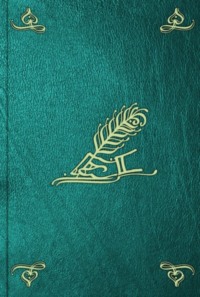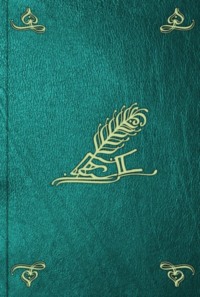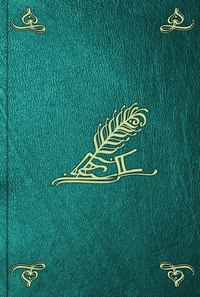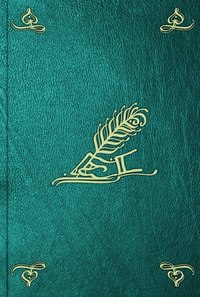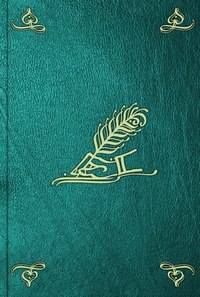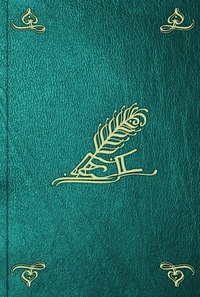 полная версия
полная версияMore Letters of Charles Darwin — Volume 1
What a wonderful case of Volucella of which I had never heard. (134/2. Volucella is a fly — one of the Syrphidae — supposed to supply a case of mimicry; this was doubtless the point of interest with Bates. Dr. Sharp says {"Insects," Part II. (in the Camb. Nat. Hist. series), 1899, page 500}: "It was formerly assumed that the Volucella larvae lived on the larvae of the bees, and that the parent flies were providentially endowed with a bee-like appearance that they might obtain entrance into the bees' nests without being detected." Dr. Sharp goes on to say that what little is known on the subject supports the belief that the "presence of the Volucella in the nests is advantageous to both fly and bee.") I had no idea such a case occurred in nature; I must get and see specimens in British Museum. I hope and suppose you will give a good deal of Natural History in your Travels; every one cares about ants — more notice has been taken about slave-ants in the "Origin" than of any other passage.
I fully expect to delight in your Travels. Keep to simple style, as in your excellent letters, — but I beg pardon, I am again advising.
What a capital paper yours will be on mimetic resemblances! You will make quite a new subject of it. I had thought of such cases as a difficulty; and once, when corresponding with Dr. Collingwood, I thought of your explanation; but I drove it from my mind, for I felt that I had not knowledge to judge one way or the other. Dr C., I think, states that the mimetic forms inhabit the same country, but I did not know whether to believe him. What wonderful cases yours seem to be! Could you not give a few woodcuts in your Travels to illustrate this? I am tired with a hard day's work, so no more, except to give my sincere thanks and hearty wishes for the success of your Travels.
LETTER 135. TO J.D. HOOKER. Down, March 18th {1862}.
Your letter discusses lots of interesting subjects, and I am very glad you have sent for your letter to Bates. (135/1. Published in Mr. Clodd's memoir of Bates in the "Naturalist on the Amazons," 1892, page l.) What do you mean by "individual plants"? (135/2. In a letter to Mr. Darwin dated March 17th, 1862, Sir J.D. Hooker had discussed a supposed difference between animals and plants, "inasmuch as the individual animal is certainly changed materially by external conditions, the latter (I think) never, except in such a coarse way as stunting or enlarging — e.g. no increase of cold on the spot, or change of individual plant from hot to cold, will induce said individual plant to get more woolly covering; but I suppose a series of cold seasons would bring about such a change in an individual quadruped, just as rowing will harden hands, etc.") I fancied a bud lived only a year, and you could hardly expect any change in that time; but if you call a tree or plant an individual, you have sporting buds. Perhaps you mean that the whole tree does not change. Tulips, in "breaking," change. Fruit seems certainly affected by the stock. I think I have (135/3. See note, Letter 16.) got cases of slight change in alpine plants transplanted. All these subjects have rather gone out of my head owing to orchids, but I shall soon have to enter on them in earnest when I come again to my volume on variation under domestication.
...In the lifetime of an animal you would, I think, find it very difficult to show effects of external condition on animals more than shade and light, good and bad soil, produce on a plant.
You speak of "an inherent tendency to vary wholly independent of physical conditions"! This is a very simple way of putting the case (as Dr. Prosper Lucas also puts it) (135/4. Prosper Lucas, the author of "Traite philosophique et physiologique de l'heredite naturelle dans les etats de sante et de maladie du systeme nerveux": 2 volumes, Paris, 1847-50.): but two great classes of facts make me think that all variability is due to change in the conditions of life: firstly, that there is more variability and more monstrosities (and these graduate into each other) under unnatural domestic conditions than under nature; and, secondly, that changed conditions affect in an especial manner the reproductive organs — those organs which are to produce a new being. But why one seedling out of thousands presents some new character transcends the wildest powers of conjecture. It was in this sense that I spoke of "climate," etc., possibly producing without selection a hooked seed, or any not great variation. (135/5. This statement probably occurs in a letter, and not in Darwin's published works.)
I have for years and years been fighting with myself not to attribute too much to Natural Selection — to attribute something to direct action of conditions; and perhaps I have too much conquered my tendency to lay hardly any stress on conditions of life.
I am not shaken about "saltus" (135/6. Sir Joseph had written, March 17th, 1862: "Huxley is rather disposed to think you have overlooked saltus, but I am not sure that he is right — saltus quoad individuals is not saltus quoad species — as I pointed out in the Begonia case, though perhaps that was rather special pleading in the present state of science." For the Begonia case, see "Life and Letters," II., page 275, also letter 110, page 166.), I did not write without going pretty carefully into all the cases of normal structure in animals resembling monstrosities which appear per saltus.
LETTER 136. TO J.D. HOOKER. 26th {March, 1862}.
Thanks also for your own (136/1. See note in Letter 135.) and Bates' letter now returned. They are both excellent; you have, I think, said all that can be said against direct effects of conditions, and capitally put. But I still stick to my own and Bates' side. Nevertheless I am pleased to attribute little to conditions, and I wish I had done what you suggest — started on the fundamental principle of variation being an innate principle, and afterwards made a few remarks showing that hereafter, perhaps, this principle would be explicable. Whenever my book on poultry, pigeons, ducks, and rabbits is published, with all the measurements and weighings of bones, I think you will see that "use and disuse" at least have some effect. I do not believe in perfect reversion. I rather demur to your doctrine of "centrifugal variation." (136/2. The "doctrine of centrifugal variation" is given in Sir J.D. Hooker's "Introductory Essay to the Flora of Tasmania" (Part III. of the Botany of the Antarctic Expedition), 1859, page viii. In paragraph 10 the author writes: "The tendency of varieties, both in nature and under cultivation...is rather to depart more and more widely from the original type than to revert to it." In Sir Joseph's letter to Bates (loc. cit., page lii) he wrote: "Darwin also believes in some reversion to type which is opposed to my view of variation." It may be noted in this connection that Mr. Galton has shown reason to believe in a centripetal tendency in variation (to use Hooker's phraseology) which is not identical with the reversion of cultivated plants to their ancestors, the case to which Hooker apparently refers. See "Natural Inheritance," by F. Galton, 1889.) I suppose you do not agree with or do not remember my doctrine of the good of diversification (136/3. Darwin usually used the word "divergence" in this connection.); this seems to me amply to account for variation being centrifugal — if you forget it, look at this discussion (page 117 of 3rd edition), it was the best point which, according to my notions, I made out, and it has always pleased me. It is really curiously satisfactory to me to see so able a man as Bates (and yourself) believing more fully in Natural Selection than I think I even do myself. (136/4. This refers to a very interesting passage in Hooker's letter to Bates (loc. cit., page liii): "I am sure that with you, as with me, the more you think the less occasion you will see for anything but time and natural selection to effect change; and that this view is the simplest and clearest in the present state of science is one advantage, at any rate. Indeed, I think that it is, in the present state of the inquiry, the legitimate position to take up; it is time enough to bother our heads with the secondary cause when there is some evidence of it or some demand for it — at present I do not see one or the other, and so feel inclined to renounce any other for the present.") By the way, I always boast to you, and so I think Owen will be wrong that my book will be forgotten in ten years, for a French edition is now going through the press and a second German edition wanted. Your long letter to Bates has set my head working, and makes me repent of the nine months spent on orchids; though I know not why I should not have amused myself on them as well as slaving on bones of ducks and pigeons, etc. The orchids have been splendid sport, though at present I am fearfully sick of them.
I enclose a waste copy of woodcut of Mormodes ignea; I wish you had a plant at Kew, for I am sure its wonderful mechanism and structure would amuse you. Is it not curious the way the labellum sits on the top of the column? — here insects alight and are beautifully shot, when they touch a certain sensitive point, by the pollinia.
How kindly you have helped me in my work! Farewell, my dear old fellow.
LETTER 137. TO H.W. BATES. Down, May 4th {1862}.
Hearty thanks for your most interesting letter and three very valuable extracts. I am very glad that you have been looking at the South Temperate insects. I wish that the materials in the British Museum had been richer; but I should think the case of the South American Carabi, supported by some other case, would be worth a paper. To us who theorise I am sure the case is very important. Do the South American Carabi differ more from the other species than do, for instance, the Siberian and European and North American and Himalayan (if the genus exists there)? If they do, I entirely agree with you that the difference would be too great to account for by the recent Glacial period. I agree, also, with you in utterly rejecting an independent origin for these Carabi. There is a difficulty, as far as I know, in our ignorance whether insects change quickly in time; you could judge of this by knowing how far closely allied coleoptera generally have much restricted ranges, for this almost implies rapid change. What a curious case is offered by land-shells, which become modified in every sub-district, and have yet retained the same general structure from very remote geological periods! When working at the Glacial period, I remember feeling much surprised how few birds, no mammals, and very few sea-mollusca seemed to have crossed, or deeply entered, the inter-tropical regions during the cold period. Insects, from all you say, seem to come under the same category. Plants seem to migrate more readily than animals. Do not underrate the length of Glacial period: Forbes used to argue that it was equivalent to the whole of the Pleistocene period in the warmer latitudes. I believe, with you, that we shall be driven to an older Glacial period.
I am very sorry to hear about the British Museum; it would be hopeless to contend against any one supported by Owen. Perhaps another chance might occur before very long. How would it be to speak to Owen as soon as your own mind is made up? From what I have heard, since talking to you, I fear the strongest personal interest with a Minister is requisite for a pension.
Farewell, and may success attend the acerrimo pro-pugnatori.
P.S. I deeply wish you could find some situation in which you could give your time to science; it would be a great thing for science and for yourself.
LETTER 138. TO J.L.A. DE QUATREFAGES. Down, July 11th {1862}.
I thank you cordially for so kindly and promptly answering my questions. I will quote some of your remarks. The case seems to me of some importance with reference to my heretical notions, for it shows how larvae might be modified. I shall not publish, I daresay, for a year, for much time is expended in experiments. If within this time you should acquire any fresh information on the similarity of the moths of distinct races, and would allow me to quote any facts on your authority, I should feel very grateful.
I thank you for your great kindness with respect to the translation of the "Origin;" it is very liberal in you, as we differ to a considerable degree. I have been atrociously abused by my religious countrymen; but as I live an independent life in the country, it does not in the least hurt me in any way, except indeed when the abuse comes from an old friend like Professor Owen, who abuses me and then advances the doctrine that all birds are probably descended from one parent.
I wish the translator (138/1. Mdlle. Royer, who translated the first French edition of the "Origin.') had known more of Natural History; she must be a clever but singular lady, but I never heard of her till she proposed to translate my book.
LETTER 139. TO ASA GRAY. Down, July 23rd {1862}.
I received several days ago two large packets, but have as yet read only your letter; for we have been in fearful distress, and I could attend to nothing. Our poor boy had the rare case of second rash and sore throat...; and, as if this was not enough, a most serious attack of erysipelas, with typhoid symptoms. I despaired of his life; but this evening he has eaten one mouthful, and I think has passed the crisis. He has lived on port wine every three-quarters of an hour, day and night. This evening, to our astonishment, he asked whether his stamps were safe, and I told him of one sent by you, and that he should see it to-morrow. He answered, "I should awfully like to see it now"; so with difficulty he opened his eyelids and glanced at it, and, with a sigh of satisfaction, said, "All right." Children are one's greatest happiness, but often and often a still greater misery. A man of science ought to have none — perhaps not a wife; for then there would be nothing in this wide world worth caring for, and a man might (whether he could is another question) work away like a Trojan. I hope in a few days to get my brains in order, and then I will pick out all your orchid letters, and return them in hopes of your making use of them...
Of all the carpenters for knocking the right nail on the head, you are the very best; no one else has perceived that my chief interest in my orchid book has been that it was a "flank movement" on the enemy. I live in such solitude that I hear nothing, and have no idea to what you allude about Bentham and the orchids and species. But I must enquire.
By the way, one of my chief enemies (the sole one who has annoyed me), namely Owen, I hear has been lecturing on birds; and admits that all have descended from one, and advances as his own idea that the oceanic wingless birds have lost their wings by gradual disuse. He never alludes to me, or only with bitter sneers, and coupled with Buffon and the "Vestiges."
Well, it has been an amusement to me this first evening, scribbling as egotistically as usual about myself and my doings; so you must forgive me, as I know well your kind heart will do. I have managed to skim the newspaper, but had not heart to read all the bloody details. Good God! What will the end be? Perhaps we are too despondent here; but I must think you are too hopeful on your side of the water. I never believed the "canards" of the army of the Potomac having capitulated. My good dear wife and self are come to wish for peace at any price. Good night, my good friend. I will scribble on no more.
One more word. I should like to hear what you think about what I say in the last chapter of the orchid book on the meaning and cause of the endless diversity of means for the same general purpose. It bears on design, that endless question. Good night, good night!
LETTER 140. TO C. LYELL. 1, Carlton Terrace, Southampton, August 22nd {1862}.
You say that the Bishop and Owen will be down on you (140/1. This refers to the "Antiquity of Man," which was published in 1863.): the latter hardly can, for I was assured that Owen, in his lectures this spring, advanced as a new idea that wingless birds had lost their wings by disuse. (140/2. The first paragraph of this letter was published in "Life and Letters," II., pages 387, 388.) Also that magpies stole spoons, etc., from a remnant of some instinct like that of the bower-bird, which ornaments its playing passage with pretty feathers. Indeed, I am told that he hinted plainly that all birds are descended from one. What an unblushing man he must be to lecture thus after abusing me so, and never to have openly retracted, or alluded to my book!
LETTER 141. TO JOHN LUBBOCK (LORD AVEBURY). Cliff Cottage, Bournemouth, September 5th {1862}.
Many thanks for your pleasant note in return for all my stupid trouble. I did not fully appreciate your insect-diving case (141/1. "On two Aquatic Hymenoptera, one of which uses its Wings in Swimming." By John Lubbock. "Trans. Linn. Soc." Volume XXIV., 1864, pages 135-42.) {Read May 7th, 1863.} In this paper Lubbock describes a new species of Polynema — P. natans — which swims by means of its wings, and is capable of living under water for several hours; the other species, referred to a new genus Prestwichia, lives under water, holds its wings motionless and uses its legs as oars.) before your last note, nor had I any idea that the fact was new, though new to me. It is really very interesting. Of course you will publish an account of it. You will then say whether the insect can fly well through the air. (141/2. In describing the habits of Polynema, Lubbock writes, "I was unfortunately unable to ascertain whether they could fly" (loc. cit., page 137).) My wife asked, "How did he find that it stayed four hours under water without breathing?" I answered at once: "Mrs. Lubbock sat four hours watching." I wonder whether I am right.
I long to be at home and at steady work, and I hope we may be in another month. I fear it is hopeless my coming to you, for I am squashier than ever, but hope two shower-baths a day will give me a little strength, so that you will, I hope, come to us. It is an age since I have seen you or any scientific friend.
I heard from Lyell the other day in the Isle of Wight, and from Hooker in Scotland. About Huxley I know nothing, but I hope his book progresses, for I shall be very curious to see it. (141/3. "Man's Place in Nature." London, 1863.)
I do nothing here except occasionally look at a few flowers, and there are very few here, for the country is wonderfully barren.
See what it is to be well trained. Horace said to me yesterday, "If every one would kill adders they would come to sting less." I answered: "Of course they would, for there would be fewer." He replied indignantly: "I did not mean that; but the timid adders which run away would be saved, and in time would never sting at all." Natural selection of cowards!
LETTER 142. H. FALCONER TO CHARLES DARWIN.
(142/1. This refers to the MS. of Falconer's paper "On the American Fossil Elephant of the Regions bordering the Gulf of Mexico (E. Columbi, Falc.)," published in the "Natural History Review," January, 1863, page 43. The section dealing with the bearing of his facts on Darwin's views is at page 77. He insists strongly (page 78) on the "persistence and uniformity of the characters of the molar teeth in the earliest known mammoth, and his most modern successor." Nevertheless, he adds that the "inferences I draw from these facts are not opposed to one of the leading propositions of Darwin's theory." These admissions were the more satisfactory since, as Falconer points out (page 77), "I have been included by him in the category of those who have vehemently maintained the persistence of specific characters.")
21, Park Crescent, Portland Place, N.W., September 24th {1862}.
Do not be frightened at the enclosure. I wish to set myself right by you before I go to press. I am bringing out a heavy memoir on elephants — an omnium gatherum affair, with observations on the fossil and recent species. One section is devoted to the persistence in time of the specific characters of the mammoth. I trace him from before the Glacial period, through it and after it, unchangeable and unchanged as far as the organs of digestion (teeth) and locomotion are concerned. Now, the Glacial period was no joke: it would have made ducks and drakes of your dear pigeons and doves.
With all my shortcomings, I have such a sincere and affectionate regard for you and such admiration of your work, that I should be pained to find that I had expressed my honest convictions in a way that would be open to any objection by you. The reasoning may be very stupid, but I believe that the observation is sound. Will you, therefore, look over the few pages which I have sent, and tell me whether you find any flaw, or whether you think I should change the form of expression? You have been so unhandsomely and uncandidly dealt with by a friend of yours and mine that I should be sorry to find myself in the position of an opponent to you, and more particularly with the chance of making a fool of myself.
I met your brother yesterday, who tells me you are coming to town. I hope you will give me a hail. I long for a jaw with you, and have much to speak to you about.
You will have seen the eclaircissement about the Eocene monkeys of England. By a touch of the conjuring wand they have been metamorphosed — a la Darwin — into Hyracotherian pigs. (142/2. "On the Hyracotherian Character of the Lower Molars of the supposed Macacus from the Eocene Sand of Kyson, Suffolk." "Ann. Mag. Nat. Hist." Volume X., 1862, page 240. In this note Owen stated that the teeth which he had named Macacus ("Ann. Mag." 1840, page 191) most probably belonged to Hyracotherium cuniculus. See "A Catalogue of British Fossil Vertebrata," A.S. Woodward and C.D. Sherborn, 1890, under Hyracotherium, page 356; also Zittel's "Handbuch der Palaeontologie" Abth. I., Bd. IV., Leipzig, 1891-93, page 703.) Would you believe it? This even is a gross blunder. They are not pigs.
LETTER 143. TO HUGH FALCONER. Down, October 1st {1862}.
On my return home yesterday I found your letter and MS., which I have read with extreme interest. Your note and every word in your paper are expressed with the same kind feeling which I have experienced from you ever since I have had the happiness of knowing you. I value scientific praise, but I value incomparably higher such kind feeling as yours. There is not a single word in your paper to which I could possibly object: I should be mad to do so; its only fault is perhaps its too great kindness. Your case seems the most striking one which I have met with of the persistence of specific characters. It is very much the more striking as it relates to the molar teeth, which differ so much in the species of the genus, and in which consequently I should have expected variation. As I read on I felt not a little dumbfounded, and thought to myself that whenever I came to this subject I should have to be savage against myself; and I wondered how savage you would be. I trembled a little. My only hope was that something could be made out of the bog N. American forms, which you rank as a geographical race; and possibly hereafter out of the Sicilian species. Guess, then, my satisfaction when I found that you yourself made a loophole (143/1. This perhaps refers to a passage ("N.H. Review," 1863, page 79) in which Falconer allows the existence of intermediate forms along certain possible lines of descent. Falconer's reference to the Sicilian elephants is in a note on page 78; the bog-elephant is mentioned on page 79.), which I never, of course, could have guessed at; and imagine my still greater satisfaction at your expressing yourself as an unbeliever in the eternal immutability of species. Your final remarks on my work are too generous, but have given me not a little pleasure. As for criticisms, I have only small ones. When you speak of "moderate range of variation" I cannot but think that you ought to remind your readers (though I daresay previously done) what the amount is, including the case of the American bog-mammoth. You speak of these animals as having been exposed to a vast range of climatal changes from before to after the Glacial period. I should have thought, from analogy of sea-shells, that by migration (or local extinction when migration not possible) these animals might and would have kept under nearly the same climate.



